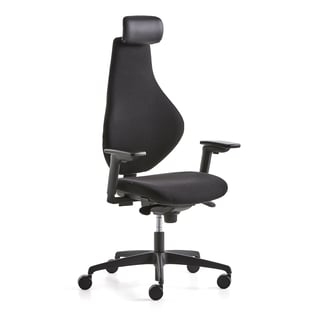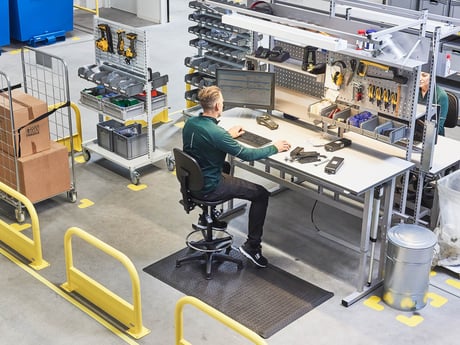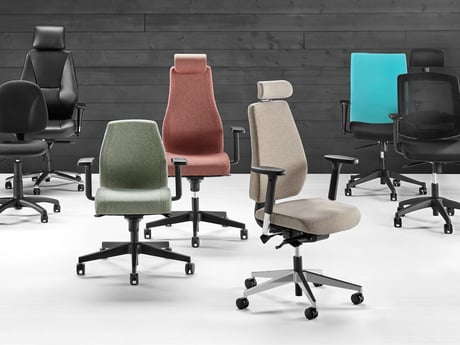
This is what 8 out of 10 people look for when searching for a new job
A strong company culture and a thoughtfully designed workplace are key for companies looking to stand out to top talent in today’s competitive job market.
"Young professionals today are as focused on finding the right workplace as they are on landing the right role," says Elin Alkeby, an organisation and leadership consultant at Sustainable People.
Attracting and retaining talent has become an increasing challenge for many companies, especially in the wake of the pandemic and the shifts it brought to the labor market. A few decades ago, "people were often just grateful to have a job," but today, employees have much higher expectations of their employers, explains Elin Alkeby.

Through Sustainable People, Elin Alkeby works closely with companies to build a strong culture, set clear goals and develop effective leadership. She highlights the importance of a strong company culture and good leadership in attracting and retaining the right talent.
- Culture is an important part of your employer branding. You can have an external image through marketing, but you need to have an internal one as well. Who are we and what do we stand for? In order to attract the right people and to get people to stay, we need to know who we are, what our goals are and what our values are and what leadership we stand for. Simply being able to answer the questions: Who likes working with us? Who do we want to attract and what is important to them? Elin says.
"This requires both time and investment to truly understand and develop," she says. To build an attractive culture, businesses need strategies that engage the entire organisation. The first step is to actively work on leadership, fostering psychological safety within management teams and establishing a shared leadership philosophy. Goals should be set collaboratively, and it's crucial that all employees feel involved and motivated.

“It’s important not to assume that just because the GPS shows you're ahead, you can slow down. The journey itself is part of the culture, and it’s always a work in progress," she explains. "One of my roles is to step in and help when things go off track.”
The office shows who you are
An often-overlooked aspect of company culture is the office environment. According to Castellum's 2024 report, 81% of people consider the office environment an important factor when searching for a new job.
Elin Alkeby highlights that the office design and atmosphere speak volumes about a company’s culture and it’s a real advantage when the sensory experience aligns with the employer branding.
“You see, hear, and feel it. In some offices, people work quietly with headphones in open spaces, while others are full of energy. It could be the scenses - what does the space smell like? What colors are used? Is there a sense of harmony? Have the visuals been thoughtfully considered?” she explains.
Can improving the office make you a more attractive employer?
“Absolutely. The first step is understanding your target audience - who are they, and what helps them thrive?" says Elin Alkeby.
A report from Coor last year shows that employers are increasingly recognising this. In fact, 77% of those surveyed stated they plan to focus on enhancing their office spaces in the coming years.
It’s fascinating how much the space we work in can impact our mood and performance. Creating a pleasant and productive work environment involves considering several factors, and one of the most important is acoustics. A room with effective soundproofing helps to create a calmer, more focused atmosphere.
This is an area where many employers can improve, especially those looking to stand out in a competitive market. According to a Leesman report, only 28% of employees in open office environments are satisfied with the sound conditions.
Helena Thelander, who works in project sales at AJ, emphasizes that reducing harsh sounds and noise is key to creating a comfortable work environment.
"It’s important to think holistically and introduce softer elements. By choosing the right sound absorbers, you can minimise disruptive noise and create a more harmonious environment for everyone in the office. Our range of soundproofing products includes a wide selection for ceilings, walls, and individual workspaces," she explains.
You can think of the office as the arena where corporate culture unfolds and develops, so it’s essential to create the right conditions. Common spaces where employees can socialise are vital, many valuable conversations happen around the coffee machine! A good office should facilitate opportunities for employees to connect and build strong relationships, notes Helena Thelander.
“The workplace significantly contributes to fostering a sense of community. A relaxed lounge environment, where employees can gather for coffee or informal meetings, enhances well-being and boosts creativity. The office serves not just as a place for work but also as a social space,” she explains.













